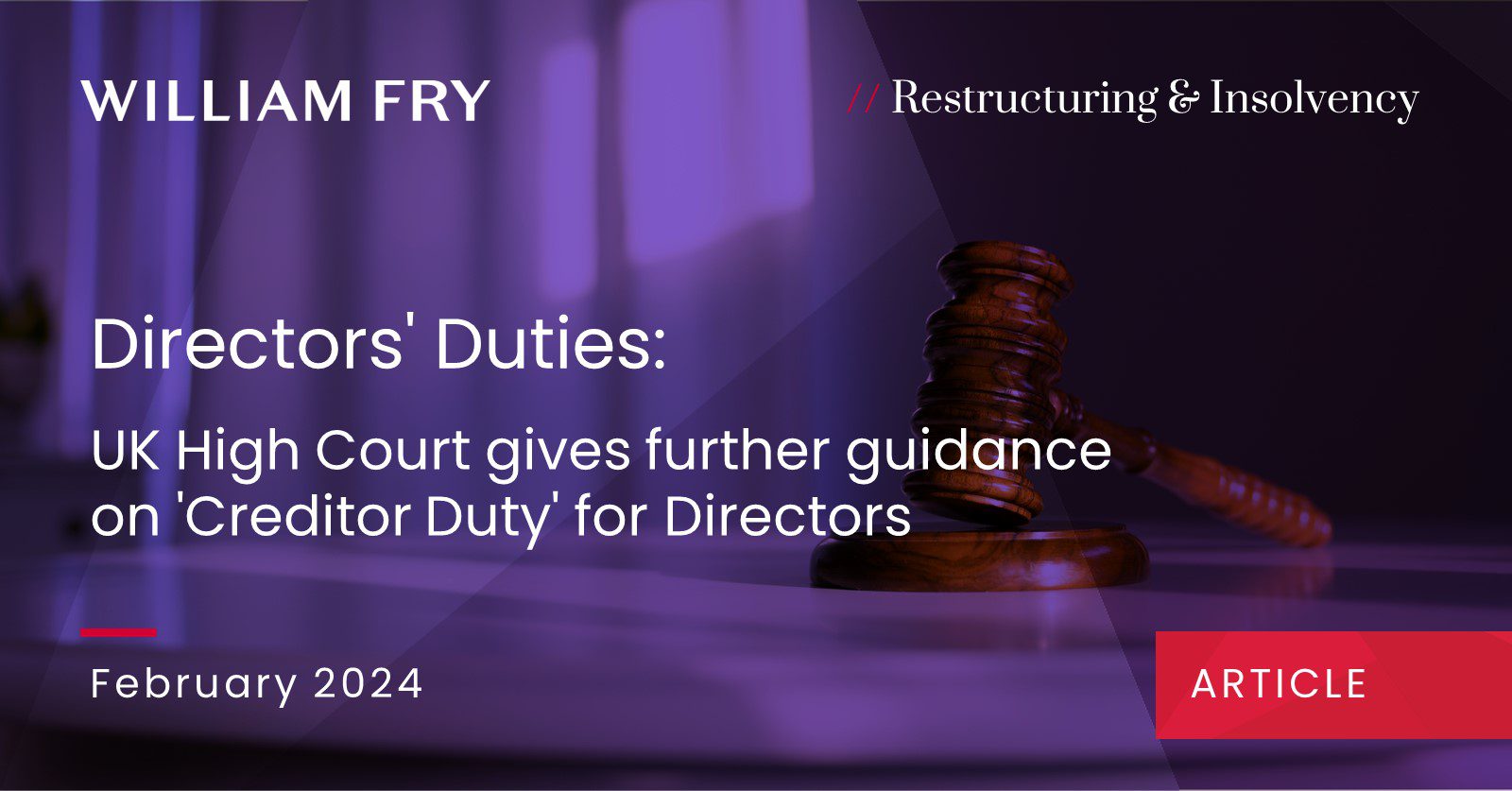Following on from the UK Supreme Court decision in Sequana (discussed here), the recent UK High Court (UKHC) decision in Hunt v Singh [2023] EWHC 1784 (Ch), further considered the duty of directors to take into account the interests of creditors in certain circumstances.
The UKHC considered whether this so-called “creditor duty” arose when a company was insolvent in circumstances where the directors believed (wrongly) that the liability giving rise to the insolvency had been avoided.
Facts
In 2002, Marylebone Warwick Balfour Management Limited (Company) entered into a conditional share scheme designed to enable certain staff to receive payments without the Company incurring national insurance contributions or PAYE liabilities to the UK tax authority. The scheme had been recommended to the Company by its tax advisors and the Company had been advised that it was “robust”.
In due course, the UK tax authority warned that if payments under the scheme were earnings, then PAYE and national insurance contributions would arise with interest. A market-wide offer was made to participants in such schemes (including the Company) to settle the liability arising, which the Company rejected. The scheme continued to operate and payments in excess of £54m were made to the Company’s employees and directors.
In November 2011 the Company was advised that tax liabilities above £38 million had accrued arising from the scheme. The Company was placed into creditors voluntary liquidation.
The liquidator brought claims against several former directors of the Company including claims for breach of duty – specifically breach of the creditor duty – for allowing payments to be made when the Company was already insolvent. The claims were dismissed at first instance (in a judgment delivered before the Sequana decision), but the liquidator appealed to the High Court in respect of the breach of the creditor duty claim during the period from 2005 (when the market-wide offer was made to participants in such schemes) until the scheme ceased to operate in 2010.
Findings
Mr Justice Zacaroli in the UKHC considered the decision in Sequana and noted that in that case, there was no doubt that the company was solvent at the time that the relevant dividends were paid. The focus of the court in that case was, therefore, whether the credit duty arose during the time before the company was actually insolvent. In contrast, in this case, taking into account the tax liability, there was no doubt that the Company was insolvent during the relevant period. The fact that the Company disputed the tax liability did not change this fact: a disputed liability does not make it a contingent one.
An unresolved question from Sequana was whether actual insolvency, irrespective of the directors’ knowledge of insolvency, is sufficient to trigger the creditor duty. The UKHC decided that some form of knowledge of insolvency (actual or constructive) by the directors is necessary to engage the duty, even where the company is actually insolvent at the relevant time.
The UKHC found that the court at first instance had applied the wrong test in deciding that the creditor duty was not engaged because the directors had acted reasonably in taking advice as to the merits of the tax authority’s claim. It found that where a company is faced with a claim to a current liability of such a size, such that its solvency is dependent on successfully challenging that claim, then the creditor duty arises if the directors “know or ought to know that there is at least a real prospect of the challenge failing”. Knowledge of a real risk that the company’s challenge to the claim may fail, therefore, equates to knowledge that it is the creditors that are potentially currently being affected by the directors’ actions and decisions.
Having decided that the creditor duty had been engaged by 2005, the UKHC however declined to make a finding as to whether that duty was breached. That question was sent back to the lower court for determination.
Conclusion
This judgment is of note in that it applies the creditor’s duty previously found to exist under English law in Sequana. It confirms that some form of knowledge of insolvency is required on the part of the directors to engage that duty. It is worth noting however that the respondent director did not partake in the appeal before the UKHC, so the decision was based on arguments put forward on behalf of the liquidator.
From an Irish perspective, the duty to consider creditors’ interests is expressly provided for under the Companies Act 2014. This UKHC decision in Hunt v Singh is important in that it provides helpful guidance on how the creditor duty is triggered in circumstances where directors are aware of a claim which, if recognised on the company’s books, renders the company insolvent.
To discuss any aspect of this article in more detail and its impact, please contact a member of our Restructuring & Insolvency team.




